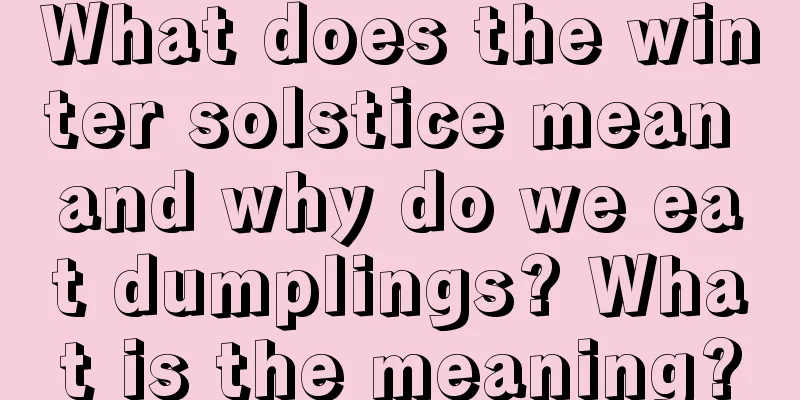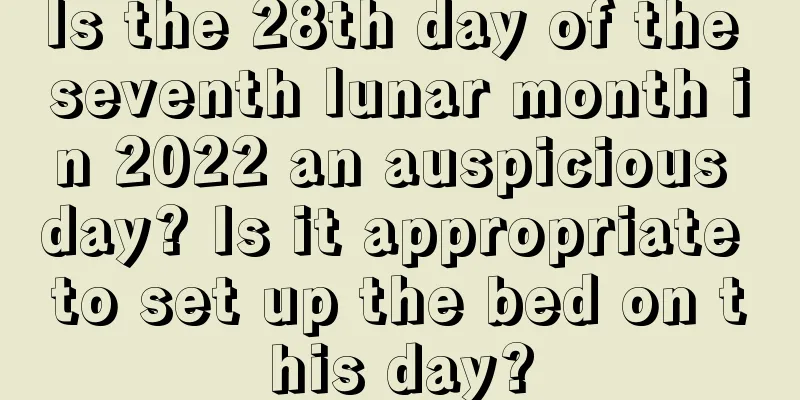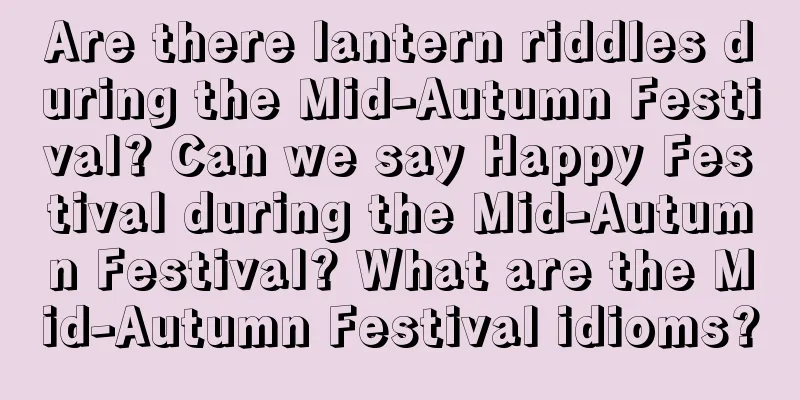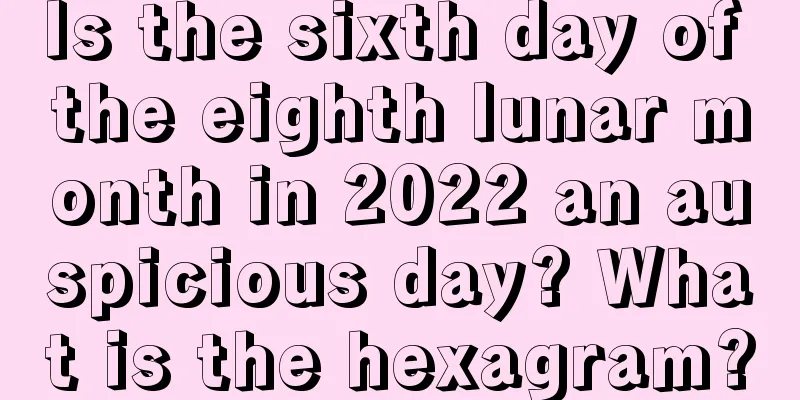What does the winter solstice mean and why do we eat dumplings? What is the meaning?

The Winter Solstice is a very important solar term in the Chinese lunar calendar and also a traditional festival of the Chinese nation. The Winter Solstice is commonly known as the "Winter Festival", "Longest Day Festival", "Sub-New Year's Day", etc. So today I want to introduce what the Winter Solstice means and why we eat dumplings? What is the meaning? “The winter solstice falls on the first day of the lunar month, and it is the will of heaven, which ends and begins again.” What is the daily fortune in the eleventh month of the lunar calendar when the winter solstice occurs? Let’s follow Mr. Shui Mo to take a look at the special topic for November of the lunar calendar in 2020.What does Winter Solstice mean?The winter solstice marks the arrival of the cold winter. At the winter solstice, the sun's ecliptic longitude is 270°. On the day of the winter solstice, the sunlight almost directly hits the Tropic of Capricorn. The days in our northern hemisphere are the shortest and the nights are the longest, and the coldest days of winter begin. Astronomical definition states that this day marks the beginning of winter in the Northern Hemisphere.After the winter solstice, the position of direct sunlight gradually moves northward, and the days in the northern hemisphere gradually become longer. As the saying goes: After eating winter solstice noodles, the day will be longer by a thread. Why do we eat dumplings during the Winter Solstice?(Legend 1) In Memory of Zhang ZhongjingAccording to legend, when Zhang Zhongjing was the prefect of Changsha, he often cured diseases for the people. One year, when a local plague was raging, he built a large pot at the gate of the government office and donated medicine to save people, winning him the love of the people of Changsha. After Zhang Zhongjing retired from Changsha and returned to his hometown, it happened to be the winter solstice. When he walked to the bank of Baihe River in his hometown, he saw many poor people suffering from hunger and cold, with their ears frozen. It turned out that typhoid fever was prevalent at that time and many people died of the disease. He felt very sad and determined to save them. When Zhang Zhongjing returned home, there were so many people seeking medical treatment that he was very busy, but he was always worried about the poor people whose ears were frozen. He imitated the method he used in Changsha and asked his disciples to set up a medical tent and a big pot on a vacant land at the East Gate of Nanyang, and open it on the winter solstice to give medicine to the poor for treatment. Zhang Zhongjing continued to give out medicine until New Year's Eve. On the first day of the Lunar New Year, people celebrate the New Year and also celebrate the recovery of their rotten ears. They make New Year food in the shape of Jiao'er and eat it on the morning of the first day of the New Year. People call this food "jiao'er", "dumplings" or "bianshi" and eat it on the winter solstice and the first day of the new year to commemorate the days when Zhang Zhongjing opened a tent to give away medicine and cured patients. (Legend 2) Nuwa created humans In Huaichuan area, eating dumplings on the winter solstice is related to Nuwa's creation of human beings. Legend has it that in the winter in ancient times, the weather was so cold that the ears of the clay figures made by Nuwa were often frozen off, so Nuwa had to sew the ears back on. One day, after Nuwa had sewed the ear of a clay figure, she temporarily put the remaining thread into the figure's mouth for it to bite, and turned around to find a pair of scissors. When she returned with the scissors, a great idea came to her mind. She tied the two ends of the string to the clay figure's ears and mouth respectively, so that the clay figure's ears would not be frozen off. Later, on the day of the winter solstice, people bit a piece of string to tie their ears for fear of having their ears frozen off. Because the shape of dumplings was very similar to ears, people gradually changed biting the string into eating dumplings. (Legend 3) In Memory of Bian Que In North China, eating dumplings during the winter solstice is related to the legendary doctor Bian Que. The winters during the Spring and Autumn Period and the Warring States Period were extremely cold and many people suffered from frostbite, their ears were frozen and the pain was unbearable. The famous doctor Bian Que chopped up mutton, chili peppers and Chinese herbs as stuffing, wrapped them in dough into the shape of ears, cooked them and distributed them to everyone to eat. As a result, frostbite was cured quickly. Later, in order to prevent and treat frostbite, people began to make dumplings during the cold winter solstice. The dumplings were delicious and could cure diseases, and the tradition has been passed down to this day. What is the meaning of eating dumplings?1. Celery filling <br /> Qin and Qin have the same pronunciation, so they have the connotation of hard work and pragmatism. Qin also means frequent. The pronunciation of celery is similar to Qincai, which means endless wealth.2. Chive filling <br /> The pronunciation of leek is similar to that of "jiucai", so it implies long-lasting wealth. The pronunciation of "jiu" itself is similar to that of "jiu", which means long-lasting. 3. Chinese cabbage filling <br /> Chinese cabbage has a similar pronunciation to “baicai” (bāi cai), so it symbolizes a hundred kinds of wealth and also represents the blessing of living together till old age. 4. Sour cabbage filling <br /> The pronunciation of "suan" is similar to "suan", and "suancai" means endless wealth. 5. Rapeseed Stuffing <br /> The pronunciation of rapeseed is similar to "youcai" (talented) and "youcai" (wealthy), so it has the connotation of being talented and wealthy. 6. Wild vegetable filling <br /> “野” means the wild, which is obtained unexpectedly, so it implies getting unexpected wealth. 7. Shiitake mushroom filling <br /> The shape of the shiitake mushroom is that the cap part bulges upwards. The pronunciation of "mushroom" is similar to "drum", so it has the meaning of flourishing and making a name for oneself. 8. Fish filling <br /> The pronunciation of fish is similar to “yu” (surplus), so it means having surplus every year. 9. Beef filling <br /> Niu means being very strong and vigorous, and there is a saying of bull market in the stock market, so it has the connotation of being very strong and vigorous. 10. Mutton filling <br /> The pronunciation of “羊” is similar to “洋”, which has a very broad meaning, so it has a lot of connotations of wealth. 11. Jujube filling <br /> The pronunciation of jujube is similar to that of “zhao”, so it has the meaning of attracting wealth. 12. Sweet filling <br /> The pronunciation of “tian” is similar to “tian”, so it has the meaning of adding wealth and treasure. |
Recommend
Analysis of the God of Happiness's position at each hour on the first day of August during the White Dew solar term in 2021
In August, the ground is filled with the fragrance...
Can I pick up the car on February 16th of the lunar calendar in 2020? What are the auspicious days for picking up the car?
When you buy a new car, you need to pick it up on...
What are the do’s and don’ts on the eighth day of the eighth lunar month in 2018?
School has started, which also means it is the ei...
What zodiac sign is November 18th in the lunar calendar in 2021? Is it Sagittarius?
The twelve zodiac signs are divided according to t...
What is the date of the tenth day of the eighth month in the lunar year of the Tiger in 2022? Is traveling okay?
What is the date of the tenth day of the eighth mo...
Is it a good day to get married on the seventh day of the fourth lunar month in 2018?
The beauty of April on earth has faded, and the p...
Is it good for people born in the Yin hour on Mother’s Day 2019 to have a good fate?
At the end of the 20th century, as China became in...
What is the day like on the fourth day of the second lunar month in 2020? Is traveling okay?
The quality of life is different every day, so let...
Is July 7, 2019, the day of the Lesser Heat, a suitable date for moving the company? What time is the Lesser Heat in 2019?
Introduction: Minor Heat is one of the 24 solar te...
What day is the National Day in 2021 in the lunar calendar? What are the benefits of National Day?
National Day falls on October 1st of the Gregorian...
Is it good to raise the beam on August 14, the day before the Mid-Autumn Festival in 2020? Why do we eat mooncakes during the Mid-Autumn Festival?
Introduction: Generally, an auspicious day is need...
Is it okay to have a caesarean section on the seventh day of the ninth lunar month in 2021? What will be the fate of the birth?
The ninth month of the lunar calendar is the third...
Check the lunar calendar for the fifth day of the third month in 2020. Is it an auspicious or unlucky day?
The almanac includes: do's and don'ts, au...
Is it a good time to move house on May 19th of the lunar calendar in 2020?
Is it a good time to move house on May 19th of th...
Is it possible to renovate on June 21st of the lunar calendar in 2022? How is this day?
Most of the sixth lunar month has passed. Is June ...









